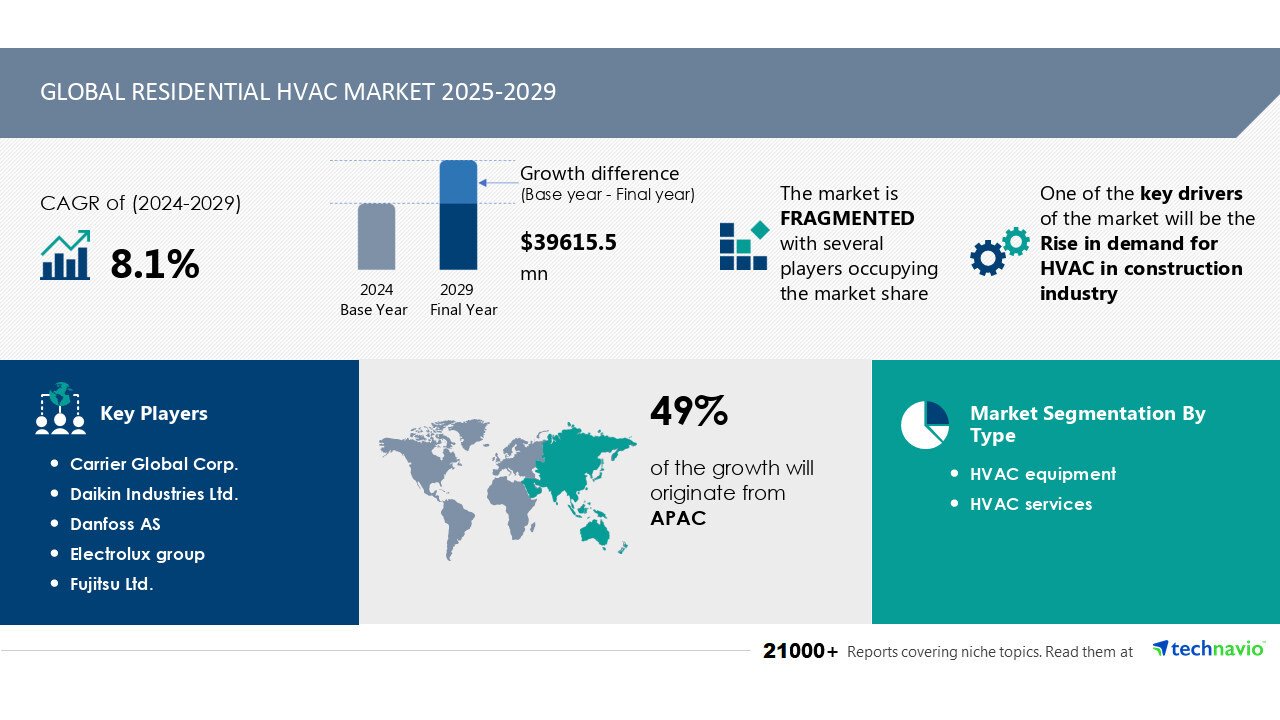Residential HVAC Market to Grow by USD 39.62 Billion (2025-2029)
The global residential HVAC market is undergoing a transformative shift, driven by technological advancements and market dynamics. The integration of artificial intelligence (AI) into HVAC systems has become a critical factor in shaping the competitive landscape and addressing both market drivers and challenges. According to Technavio, the market size is expected to grow by USD 39.62 billion between 2025 and 2029, with a compound annual growth rate (CAGR) of 8.1% during this period.
Market Drivers
1. Rise in Demand for Smart HVAC Systems
- AI and Automation: Smart equipment leveraging AI for automation, power evaluation, and energy optimization is gaining popularity. AI-powered solutions enable predictive maintenance, real-time diagnostics, and automated adjustments for efficiency and comfort.
- Consumer Spending: Rising global temperatures and urbanization have boosted consumer spending on HVAC systems, especially energy-efficient models.
2. Integration with the Construction Industry
- The construction industry, a significant consumer of HVAC systems, increasingly demands energy-efficient and sustainable solutions. Builders prioritize underfloor heating and variable refrigerant volume (VRF) technologies, which reduce operational costs and environmental impact.
3. Regulatory and Policy Support
- Governments worldwide are introducing policies to reduce greenhouse gas emissions and encourage renewable energy adoption. Heat pumps, particularly in Europe and North America, benefit from policy incentives promoting energy conservation.
Key Trends
1. AI-Driven Power Evaluation Software
- AI-enabled power evaluation software is revolutionizing decision-making in HVAC system selection. This software evaluates lifetime energy consumption, enabling contractors and homeowners to make informed, cost-effective decisions.
2. Smart Features
- Features like sleep mode, temperature control, and remote operability are becoming standard in smart HVAC systems. Brands such as Hisense and IntelliPro are leading the innovation curve.
3. Indoor Air Quality (IAQ) Solutions
- Demand for air ventilators, cleaners, and filtration systems has surged due to health concerns such as virus transmission and air pollution. AI-based sensors enhance IAQ solutions, ensuring optimal performance.
Market Challenges
1. Supply Chain Constraints
- Global supply chain disruptions, including semiconductor chip shortages and rising raw material costs, have delayed manufacturing and delivery times for HVAC equipment.
2. Complex Equipment Maintenance
- Advanced HVAC systems require regular maintenance to ensure peak performance. Neglected systems consume more energy and have shorter lifespans, posing a challenge to end-users.
3. Economic and Regulatory Factors
- Rising electricity consumption, government restrictions, and economic uncertainties affect market growth. However, opportunities exist in renewable energy integration and automation.
Key Players
The market is semi-consolidated, with prominent companies focusing on AI and sustainable innovations. Key players include:
- Carrier Global Corp.
- Daikin Industries Ltd.
- Danfoss AS
- Electrolux Group
- Johnson Controls International Plc
- Mitsubishi Electric
- Panasonic Holdings Corp.
- Trane Technologies Plc
These companies are investing heavily in AI-based energy-efficient systems to meet growing consumer demands and regulatory requirements.
Opportunities Ahead
The residential HVAC market offers significant opportunities for growth and innovation:
- Expansion in Emerging Economies: Low-interest rates and urbanization are boosting HVAC demand in developing regions.
- Renewable Energy Integration: Incorporating renewable energy and advanced ventilation systems can address both cost and environmental concerns.
- AI and IoT Adoption: AI combined with IoT technology enables seamless integration with smart homes and building management systems.
Conclusion
AI is redefining the HVAC market by enabling smarter, more efficient systems that meet the demands of modern consumers and regulators. While challenges persist, opportunities in energy efficiency, renewable energy adoption, and digital innovation position the HVAC market for robust growth. To stay ahead, stakeholders must prioritize AI-driven innovations and sustainable practices to navigate the evolving landscape.
Read More
